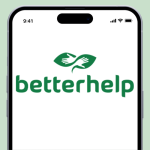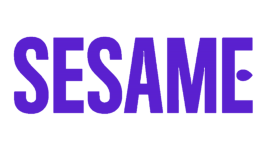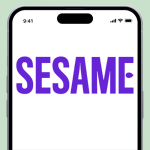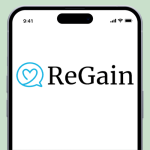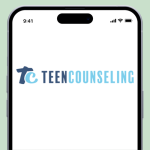Table of Contents
- We spent more than 10,000 hours researching over 70 online therapy platforms, and our testers signed up for the 20 most popular platforms to bring you our top picks.
- Our testers test each platform for at least four weeks, focusing on the sign-up process, therapist selection, therapy session quality, and customer service interactions.
- We surveyed over 2,000 online therapy users, held focus group interviews with both users and therapists, and consulted over 60 mental health experts.
- We score each platform according to affordability, data privacy, availability, and inclusivity.
- Our pages are updated regularly to update pricing and service information and reflect our ongoing testing of new online therapy platforms.
- Learn more about how we tested online therapy platforms.
Key Takeaways
- BetterHelp is our best online therapy platform overall due to the site’s extensive therapist network, extra features, and competitive pricing.
- We’ve learned that online therapy users without insurance can expect to pay between $200–$450 a month for virtual therapy. With insurance, copays can be as low as $20 or less per visit.
- Through surveys, focus groups, and testing, we determined important factors to consider when choosing an online therapy platform, including pricing, types of therapy offered, therapist availability and connection methods, data privacy, and ease of use.
We know it can be hard to find affordable mental health care when you need it. Virtual therapy can help connect you to a licensed professional therapist or online psychiatrist who can help. Whether you’re looking for online therapy covered by insurance or an online therapy platform where you’ll pay out of pocket, we want you to find the best online therapy for your needs.
To help you narrow your search, our Handbook Team researched 70 sites and surveyed 2,000 people to find out what matters most to online therapy users. We then signed up for and tested 20 online therapy options. We evaluate each platform for affordability, data privacy, availability, and inclusivity. These are the top nine we recommend.
9 best online therapy services of 2025
Here are our top online therapy platforms:
- BetterHelp: Best overall
- Brightside: Best for anxiety and depression
- Online-Therapy.com: Best for CBT
- Talkspace: Best for using insurance
- Sesame: Best for same-day appointments
- Zocdoc: Best provider directory
- Regain: Best for couples
- Teen Counseling: Best for teens
- Little Otter: Best for families
Data privacy on mental health platforms
In addition to understanding how your data is collected and used before signing up for a platform, we recommend the following basic steps that we learned from the U.S. Department of Health and Human Services (HSS) and Mozilla Foundation’s *Privacy Not Included project:
- Attend your online therapy appointment in a private location, preferably not on a public Wi-Fi network.
- Use your personal computer when possible.
- Look out for checkboxes during sign-up to opt out of data tracking or medical information disclosure.
- Sign up with your email, not a social login like Facebook.
- Choose a strong password to create a secure account login.
- Review the platform’s privacy policy before signing up to see if they are HIPAA-compliant or if they share private information with third parties.
BetterHelp: Best overall
Pros and cons of BetterHelp
Why BetterHelp is our pick for best overall
BetterHelp earns our top spot thanks to a combination of user satisfaction, therapist selection, and features. We like how easy it was to switch providers—a process that can be challenging on other online therapy platforms. Additionally, BetterHelp includes bonus features that we believe add value to its subscription plans, including group sessions, webinars, a digital journal, and worksheets assigned by your therapist.
Our therapist’s testing notes on BetterHelp
“The site had different things to access like journals etc, they were straightforward and had examples which are user-friendly and easy to use. I can see how the site is trying to make it personal for the users.”
Who may like BetterHelp: BetterHelp is the best option for those seeking extra features with their online therapy subscription and who want to connect with their therapist before their first session.
Who may want to avoid BetterHelp: Those seeking an online therapy platform that takes insurance or who require psychiatric care should choose a different platform.
BetterHelp says that it has more than 30,000 licensed therapists on the platform. Our Handbook Team went through the therapist matching and switching process to discover how easy it was to find a good therapist fit. Here are a few of the features we found that can help you find the right therapist:
- A therapist-matching questionnaire that considers your gender identity, sexual orientation, areas of focus, and therapist expectations.
- Ability to chat with your therapist to get to know their approach before booking an appointment.
- Easy process to switch therapists anytime.
- Ability to choose a new therapist based on a list of matches.
How we score BetterHelp
| Criteria | Score | How BetterHelp measures up |
| Availability | 10/10 | BetterHelp offers customer support 7 days/week, with multiple ways to contact them (chat, email, phone, etc.). The platform provides therapy through messaging, live videos, and phone calls and is available in all 50 states. |
| Data Privacy | 9.7/10 | BetterHelp offers transparent pricing without hidden fees, clearly states its privacy policy on its website, and has HITRUST certification. Yet the platform currently has one or more lawsuits or class action cases filed against them. |
| Inclusivity | 8/10 | BetterHelp allows users to browse a limited directory online before paying and shows diverse individuals on its website. However, it does not have an anti-discrimination or diversity statement. |
| Affordability | 9.5/10 | BetterHelp’s average weekly cost is $66-81. It has a clear pricing structure and offers financial assistance. Subscribers can pay using FSA/HSA funds. Yet the platform does not accept insurance, and there is no option to pay per session. |
BetterHelp tester insights
Our tester is especially impressed by the bonus features you can explore to support your therapy journey outside of interactions with therapists. “It’s cool that you can keep a journal and choose whether or not to share it with your therapist,” says one tester. “You can also set goals with your therapist, and there are so many classes to choose from to supplement your experience.”
From one of our BetterHelp testers
“Group sessions are facilitated by licensed therapists, but they’re not group therapy. They’re more like peer support groups. I liked that the moderator didn’t pressure anyone to participate. He did a poll at the beginning to get to know where everyone was on their particular journey and then opened up the discussion. We were encouraged to raise our hands if we had something to add and to share reactions (like the heart) while others were speaking. It was nice to see hearts light up people’s screens while sharing something particularly personal.”
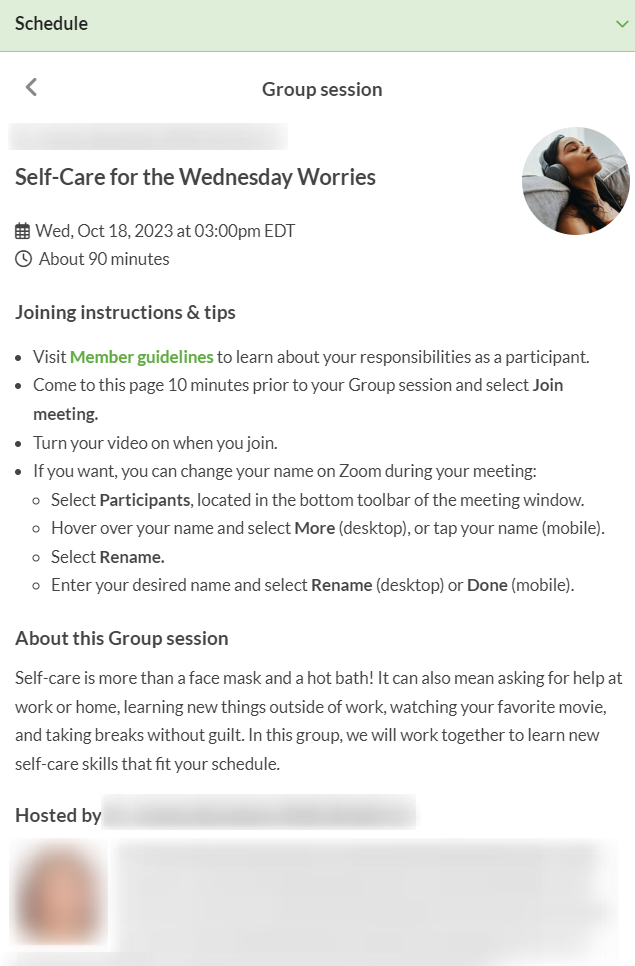
What other BetterHelp users say
In our October 2023 survey of online therapy users, BetterHelp users had the highest satisfaction rates with their therapists. In fact, 86 percent of respondents rated their therapists as good or very good—that’s almost nine out of 10 BetterHelp users we surveyed.
In our February 2024 survey of 100 BetterHelp users, 87 percent said their therapist creates a welcoming environment, and 78 percent reported that their therapist uses inclusive language, such as gender-neutral pronouns and culturally sensitive terminology. BetterHelp is also effective, with 87 percent of BetterHelp users reporting a reduction of symptoms that led them to therapy in the first place.
Read our in-depth BetterHelp review for more information.
Brightside: Best for anxiety and depression
Pros and cons of Brightside
Why Brightside is our pick as the best for anxiety and depression
We like that Brightside integrates online therapy and online psychiatry as, in some cases, a combination approach may be more beneficial than therapy alone for those with anxiety and depression. We also like that the Brightside app includes features such as a depression and anxiety symptom tracker, self-guided lessons on topics related to anxiety and depression, and weekly check in surveys to help gauge your progress. Whether you use Brightside for therapy, psychiatry, or both, these added features can help you stay focused on your mental health between sessions with your provider.
Who may like Brightside: We recommend Brightside for those with anxiety and depression, especially those looking for a combination approach to treatment through online therapy and psychiatry on one platform.
Who may want to avoid Brightside: Brightside does not treat kids or teens, and the psychiatrists on the platform cannot prescribe controlled substances, including some anxiety medications and many attention-deficit/hyperactivity disorder (ADHD) medications.
Brightside’s care coordination and customer service are responsive and helpful, and its providers are in-network with some insurance plans, including Medicare Part B. It also accepts Medicaid in select states. Additionally, your provider’s notes can be shared with any other providers on the platform, so switching between therapists or psychiatry providers is a seamless experience.
How we score Brightside
| Criteria | Score | How Brightside measures up |
| Availability | 8.4/10 | You can reach Brightside’s customer service Monday through Friday during normal working hours via phone or email, but not chat. Users can connect with their provider through live videos and messaging. Brightside does not offer couples or group therapy. It is available in all 50 states and has its own mobile app. |
| Data Privacy | 10/10 | Brightside has no current lawsuits or class actions. Pricing and data privacy information are transparent and comprehensive. Brightside has HITRUST certification but does not abide by PCI-DSS for credit card payments. |
| Inclusivity | 9.2/10 | Brightside’s website includes diverse individuals and a published anti-discrimination statement. However, you cannot browse therapist profiles without signing up. |
| Affordability | 9.6/10 | The average weekly cost of Brightside ranges from $66-$81, though you cannot pay per session. The platform accepts insurance, and users can pay using FSA/HSA funds. Brightside does not offer financial assistance. |
Brightside tester insights
Similar to Talkspace and BetterHelp, Brightside first matches you with a provider. If you want to switch providers, you’ll have to request one through customer service, which may give you a few therapist bios to choose from. We didn’t like this process as much as being able to view provider profiles ourselves, but we still like having the choice. Our testers switched providers and found Brightside customer service very helpful in the matching process.
From one of our Brightside testers
“When I had my first meeting with my new therapist, she was able to access notes in my account to see what I had been working on in the past. It was nice not to have to start from scratch with a new therapist, which can sometimes be overwhelming when trying new providers.”
Our testers also made several notes about the bonus features available on the Brightside app, including check-in surveys intended to gauge your levels of depression and anxiety. Testers like the video lessons on topics like “how to set goals for therapy” and “how to identify treatment-interfering behaviors (TIB),” which they define as “anything that makes it challenging to effectively participate in therapy.” Each lesson opens with a breathing exercise to encourage mindfulness.

What other Brightside users say
In our October 2023 survey of 600 online therapy users, 55 percent of Brightside users reported connecting with a mental health provider within one week or less of signing up for the platform. Though Brightside accepts several insurance plans, only 37 percent of Brightside users report using insurance to pay for services.
In our February 2024 survey of 100 Brightside users, 88 percent felt their therapist created a welcoming environment, and 84 percent reported that their therapist created a safe space.
To learn more, read our in-depth Brightside review.
Online-Therapy.com: Best for CBT
Pros and cons of Online-Therapy.com
Why Online-Therapy.com is our pick for best cognitive behavioral therapy (CBT)
Online-Therapy.com specializes in cognitive behavioral therapy (CBT), a treatment approach that encourages a shift to more helpful behaviors and thoughts and a method shown to be effective for conditions including anxiety and depression. We also like that Online-Therapy.com’s structured, CBT-based approach provides bonus tools like worksheets to help address symptoms of anxiety and depression.
Who may like Online-Therapy.com: Anyone who wants to set specific goals for changing how they think and behave could benefit from Online-Therapy.com’s CBT-focused approach.
Who may want to avoid Online-Therapy.com: If you’re seeking a therapist for ongoing counseling rather than to treat a specific concern or prefer a different approach to therapy than CBT, you should pursue other platforms.
CBT is well-researched in treating individuals with depression, anxiety, obsessive-compulsive disorder (OCD), and addictions. Ling Lam, a licensed therapist and academic lecturer at Santa Clara University, explains that one of CBT’s strengths is how it leverages intentional practices like the activities assigned outside of therapy sessions. “I think journaling and CBT worksheets are important parts of any therapy, whether CBT or not.” All of Online-Therapy.com’s therapists are trained in CBT, and all plans come with an eight-part self-guided CBT program.
How we score Online-Therapy.com
| Criteria | Score | How Online-Therapy.com measures up |
| Availability | 9.1/10 | Online-Therapy.com’s customer support is available 7 days/week, but you can only reach out via email. Users can connect with their providers via live videos, phone calls, and messaging, and the platform offers group and couples therapy. There is no Online-Therapy.com app, and the platform is only available in 46 states |
| Data Privacy | 8.4/10 | Pricing on Online-Therapy.com is transparent, without hidden fees, and its privacy policy is clearly stated on the website. The platform has no lawsuits, but it is not HITRUST-certified. Online-Therapy.com does abide by PCI-DSS for credit card payments. |
| Inclusivity | 5.2/10 | Users can view a limited directory online, but Online-Therapy.com does not have an inclusivity or diversity statement, and the diversity shown on the website is limited. |
| Affordability | 9.6/10 | On average, Online-Therapy.com costs less than $50 a week. Its pricing structure is clear, and the platform offers financial assistance. Subscribers can pay using FSA/HSA funds. The platform does not accept insurance, and there is no option to pay per session. |
Online-Therapy.com tester insights
Our Online-Therapy.com tester had to switch from their first provider match because of poor availability. They found it easy to switch but didn’t find many provider options when searching for therapists with expertise in a certain area. Although our tester had a positive experience with the provider they eventually chose, the clinician didn’t mention the extra resources like the worksheets and digital journal, and our tester had to explore these for themselves. Online-Therapy.com does offer a weekly check-in, called the Weekly Test, that allows users to rate the intensity of their symptoms. Though the check-in is brief, we like that the platform offers an opportunity to track and compare symptoms week-to-week.
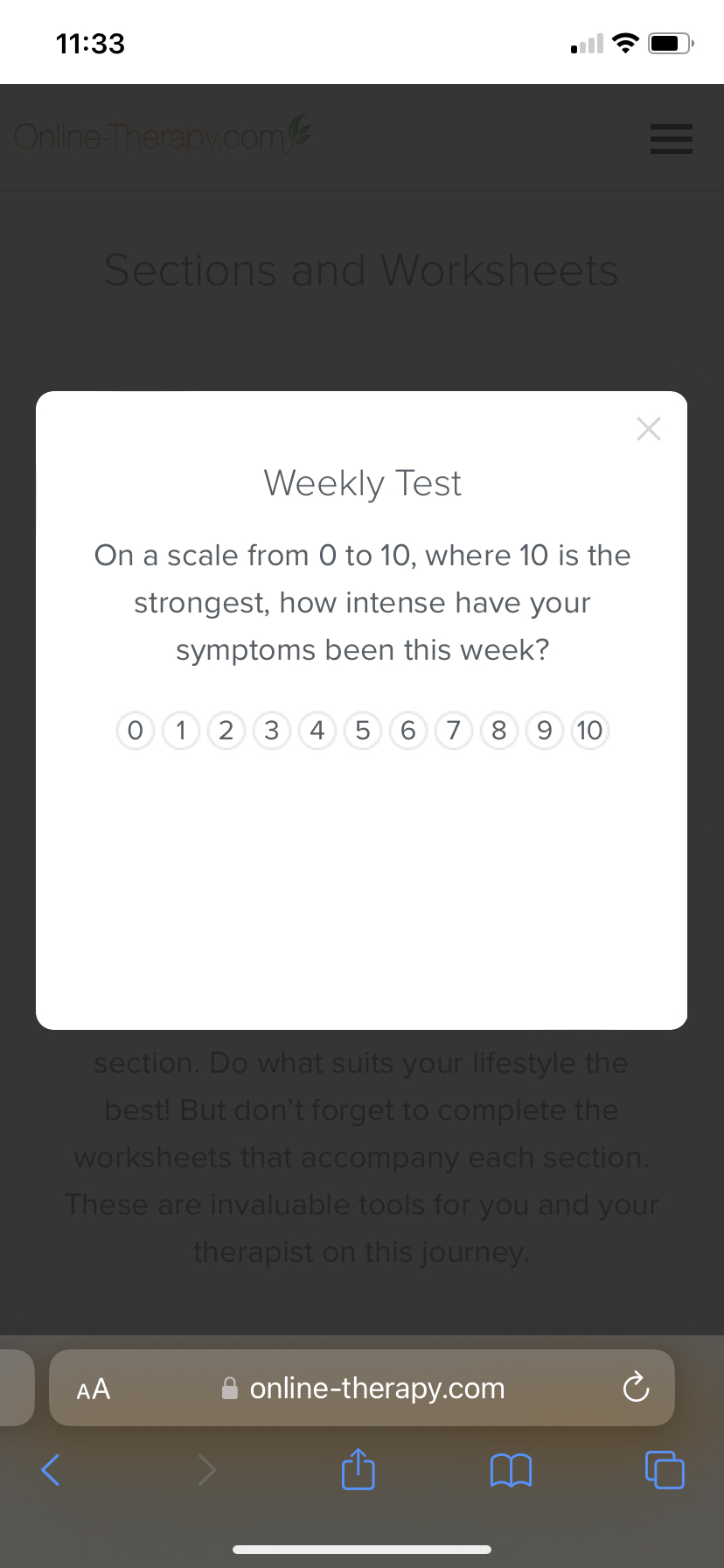
Our tester had positive experiences with customer service, and they were incredibly responsive when our tester reached out about switching to a new therapist. The biggest complaint from our tester was the limited availability of providers in their area. Depending on where you live and how full your calendar is, finding a provider who meets your scheduling needs on this platform could be difficult.
From one of our Online-Therapy.com testers
“No therapist had a time slot at a normal hour outside of my working hours, and few therapists offered scheduling options that fit realistic needs. Some were only available for a four-hour slot each Sunday.”
What other Online-Therapy.com users say
In our October 2023 survey of 600 online therapy users, more than half of Online-Therapy.com users were able to get an appointment within one week of signing up, and 82 percent of users felt that Online-Therapy.com was a good value relative to the money they spent.
Online-Therapy.com users also appreciate the platform’s willingness to provide financial support. In our focus group of online therapy users, one participant told us, “I had to apply for financial aid on Online-Therapy.com to actually get the plan I’m currently on, which was 30 percent off. It was really a good deal for me.”
Read our full Online-Therapy.com review for more information.
Talkspace: Best for using insurance coverage
Pros and cons of Talkspace
Why Talkspace is our pick for the best platform for insurance
Talkspace is one of the few online therapy platforms that accept in-network insurance from major providers, such as Aetna, Cigna, and Optum. Our testers found it easy to determine how much you’ll have to pay for therapy on the platform without signing up for an account first. That’s why it earns our top spot for therapy platforms that accept insurance.
Talkspace utilizes dialectical behavior therapy, which helps patients identify negative thoughts and change them.
Who may like Talkspace: If you’re hoping to use your insurance for online therapy, Talkspace accepts almost every major insurance provider.
Who may want to avoid Talkspace: Those hoping to pay out of pocket for their online therapy can find more affordable options than Talkspace.
When switching therapists on Talkspace, you supply some information on your preferences and can see a detailed profile of your therapist matches. Therapist profiles display their experience level, availability, and a brief video bio. You can state your gender preference for a therapist on the questionnaire, but not other preferences, like choosing a person of color or LGBTQ+ provider.
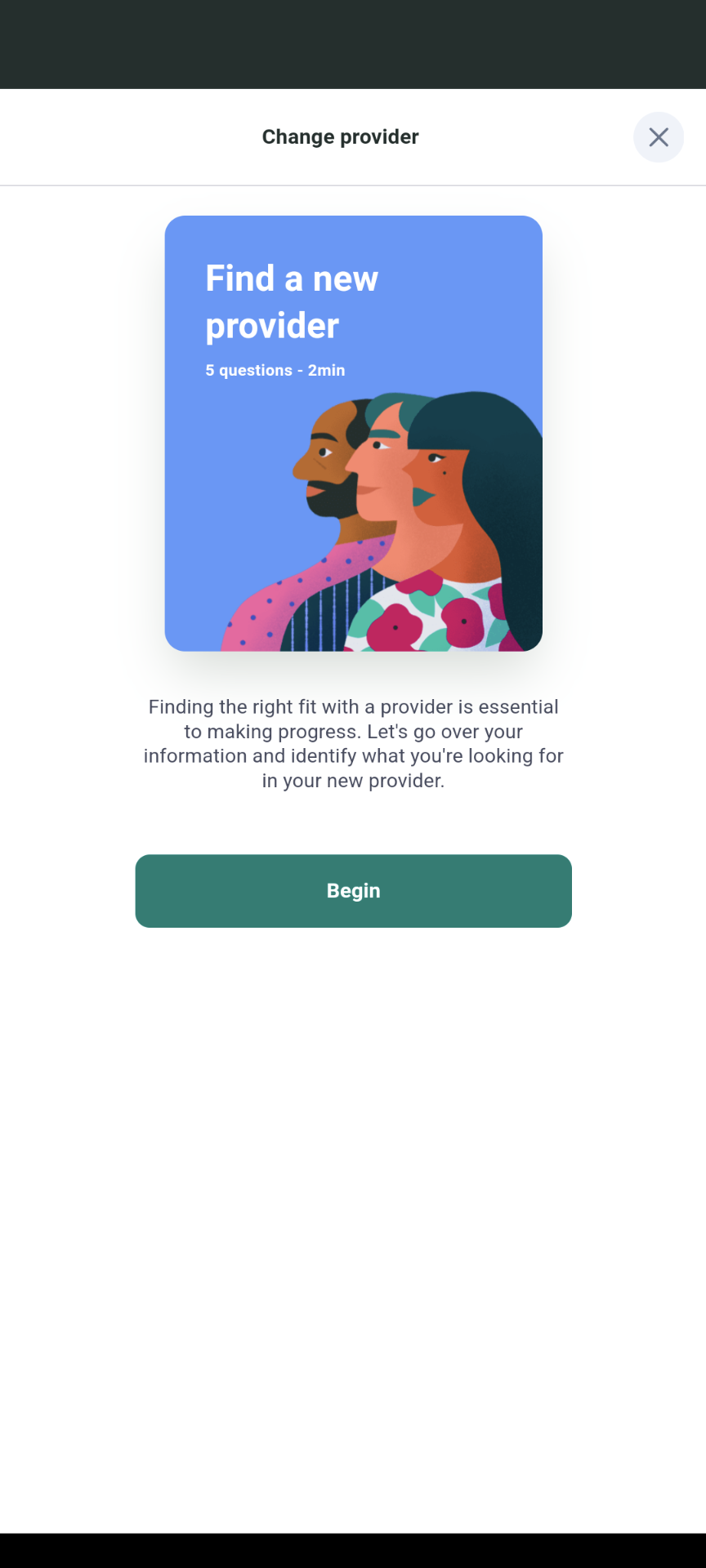
From one of our Talkspace testers
“Although my first match didn’t work out, I liked that Talkspace showed when my therapist matches were more likely to be active so that I could pick someone who could answer my messages during the evenings when I was more available.”
How we score Talkspace
| Criteria | Score | How Talkspace measures up |
| Availability | 9.3/10 | Talkspace only allows users to communicate with customer care via email, which lowered their availability score. However, the platform allows for subscribers to engage in all forms of therapy (live video, phone, messaging) and offers couples and group counseling. It offers a mobile app, flexibility to switch providers, and is available in all 50 states. |
| Data Privacy | 8.4/10 | Pricing on Talkspace is clear, and there are no hidden fees. We appreciate that Talkspace clearly states its privacy policy and offers information about updates and how to have information deleted. However, Talkspace is not HITRUST-certified and does not abide by PCI-DCS for credit card payments. The platform has one or more class actions or lawsuits currently pending. |
| Inclusivity | 6.2/10 | Users can view a limited Talkspace directory online before signing up, and we found the homepage to be fairly diverse in language and imagery. Talkspace does not have an anti-discrimination or diversity statement posted. |
| Affordability | 9.6/10 | The average weekly cost of Talkspace is $82-$97. The platform does not offer the option to pay per session but accepts insurance and FSA/HSA for payment. While Talkspace does not offer financial assistance, its free online tools, and mental health content improved its overall affordability score. |
What other Talkspace users say
Almost half (49 percent) of our October 2023 survey respondents paid for online therapy using their insurance coverage. Without insurance, Talkspace had the highest per-session cost for its video + messaging plan at $99. However, if covered, a Talkspace session could cost as $0 out of pocket.
We want to highlight that the New York City Health Department offers free mental health support for New York City teens on Talkspace through a program called NYC Teenspace. As of this writing, teens ages 13–17 can get Talkspace’s video + messaging therapy plan for free until they turn 18. Teens can sign up for the platform with a guardian’s permission and have access to the Talkspace Go app, which has interactive lessons and exercises for teens.
Read our in-depth Talkspace review for additional details.
Sesame: Best for same-day appointments
Pros and cons of Sesame
The Handbook Team appreciates Sesame’s detailed provider profiles and availability schedules, which make it quick and easy to book appointments, often within 24 hours. We also like that Sesame offers a pay-per-session structure, making online therapy and psychiatry more accessible for those without mental health insurance coverage.
Why Sesame is our pick for same-day appointments
Who may like Sesame: For people who want to connect with a therapist quickly, Sesame can often offer appointments in as little as a day. Sesame is also a good option for those seeking to pay by appointment without getting locked into a subscription.
Who may want to avoid Sesame: Those seeking extra features like webinars, group sessions, or online learning won’t find it in Sesame’s “no frills” approach.
According to one survey, the national average wait time for therapy services is 48 days, almost seven weeks. Getting an appointment with a psychiatrist can take even longer. Sesame’s easy signup process can connect you with providers quickly. In fact, many providers even have same-day availability.
However, the number of licensed providers available on Sesame varies by location. Depending on your state, you may have a different level of choice regarding provider availability. For example, as of this writing, users in Vermont can choose from nine providers, whereas users in Alaska only have two providers to choose from.
When searching in Charlotte, North Carolina, on a Sunday night, our tester found online mental health consult and prescription refill appointments available that same night, some in under an hour. Five providers were available in our tester’s area for therapy appointments, and one had open appointment times the next day. The others had appointments available on Tuesday, Wednesday, and Friday that week. While only one provider was listed for online psychiatry consults in the area, they had appointments available the next morning starting at 10 a.m.
How we score Sesame
| Criteria | Score | How Sesame measures up |
| Availability | 8.8/10 | Sesame’s customer service is available 7 days a week, and users can reach out via phone, email, or chat. While the platform offers group and couples therapy, users can only connect with their providers via live video. Sesame is available in all 50 states, and it’s easy to switch providers at any time. |
| Data Privacy | 9.3/10 | Sesame’s pricing is clear and transparent, and its privacy policy has information about updates and opting out. Because of how Sesame’s platform works, HITRUST certification and PCI-DSS compliance depend on the provider you choose. |
| Inclusivity | 6.2/10 | Sesame does not have a published anti-discrimination and diversity statement. Yet the platform does allow potential users to browse therapist profiles before signing up, and its homepage shows diverse individuals. |
| Affordability | 9.5/10 | Pricing on Sesame varies by provider, and users can pay per session. However, those who would like to user their insurance will need to find another platform. Sesame accepts FSA/HSA funds to cover costs, though the platform does not offer financial assistance. |
Sesame tester insights
Our tester finds it easy to search for a variety of online mental health care providers in their area using Sesame. Providers are organized according to the services they offer, including online mental health consults, online couples therapy sessions, online therapy sessions for new patients, prescription refills, and online psychiatry consults.
Each provider’s profile includes a schedule of the earliest available appointment times. Sesame also features a tool to filter your results for providers you can see within two hours, though this was only available on the mental health consult and prescription refill options for our tester.
From one of our Sesame testers
“The first therapist I met with requested a follow-up appointment after my first visit, but the second therapist I met with just said, ‘I’m here if you’d like to talk again.’ I like that I can use this platform for ongoing therapy or one-and-done sessions.”
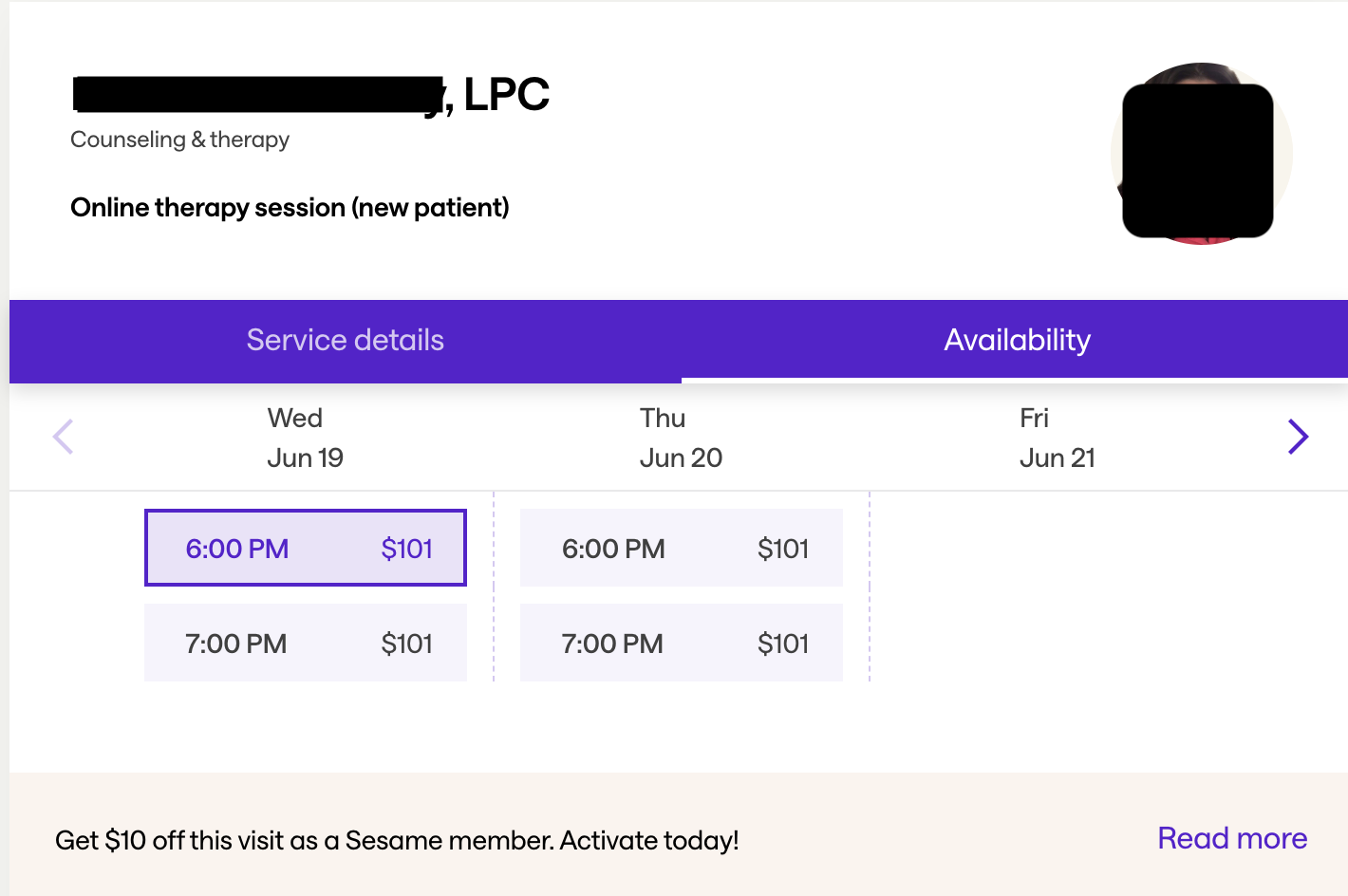
What other Sesame users say
In our February 2024 survey of 100 Sesame Care users, 75 percent of users were satisfied with the therapist they were matched with, and 74 percent saw a reduction of symptoms that led them to therapy in the first place.
In our October 2023 survey of 600 online therapy users, 31 percent of Sesame users reported staying with their provider between seven to 12 months.
Read more in our in-depth Sesame Care review.
Zocdoc: Best provider directory
Pros and cons of Zocdoc
Why Zocdoc is our pick for the best provider directory
Zocdoc’s detailed search tool has filters to help you find a provider you’re comfortable with who accepts your insurance. Our testers appreciate this extensive provider directory and filters, which make it easy to find providers who fit certain criteria, such as ethnicity, gender identity, or cultural background.
You can filter therapist search results using the following categories:
- Insurance coverage
- Preferred appointment date.
- Preferred appointment time.
- Visit reason.
- Specialty.
- Distance (if you’re looking for in-person therapy).
- Type of visit (whether it’s a virtual video visit or an in-person visit).
- Gender.
- Patient age range.
- Modality (couples, individual, family, or group therapy).
- Provider ethnicity.
- Provider languages spoken.
- Provider sexual orientation.
- Provider faith.
- Treatment approaches.
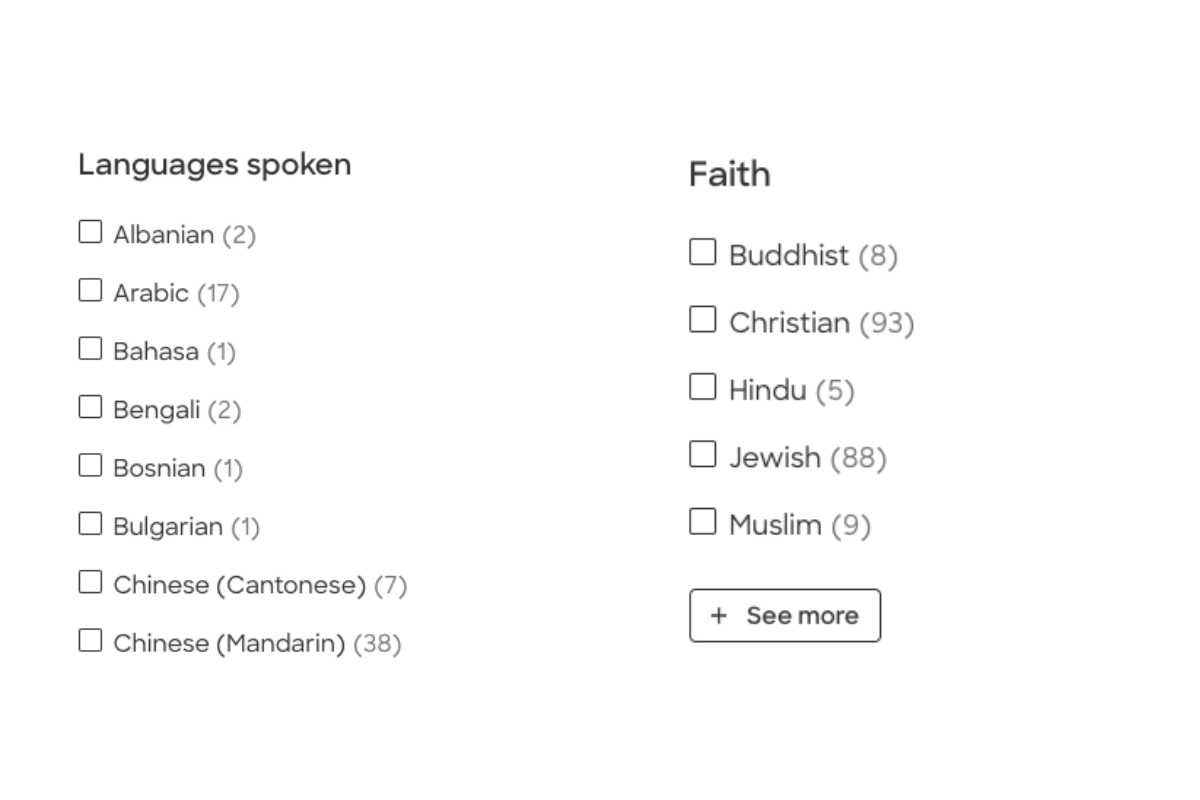
Who may like Zocdoc: If choosing your provider is important to you, Zocdoc offers an extensive provider directory and the ability to narrow your search through multiple categories, including insurance coverage.
Who may want to avoid Zocdoc: Zocdoc’s varying pricing and appointment availability may not work for those who need to know their budget and schedule in advance. Zocdoc also often requires you to use more than one platform—the Zocdoc platform and the provider’s website or platform of choice—in order to schedule and pay, which can be frustrating for some users.
How we score Zocdoc
| Criteria | Score | How Zocdoc measures up |
| Availability | 8.5/10 | Zocdoc’s customer service is available Monday through Friday during normal business hours. Users can reach out via phone, email, or chat. The platform offers couples and group therapy, but the only way to connect with your provider is through live video calls. Zocdoc is available in all 50 states, and those who need to switch providers can do so at any time. |
| Data Privacy | 8.7/10 | There are no pending lawsuits or class actions filed currently against Zocdoc. The platform has transparent pricing, and the privacy policy is clear on the website. However, Zocdoc does not have HITRUST certification and does not abide by PCI-DSS for credit card payments. |
| Inclusivity | 9.2/10 | Zocdoc does have an anti-discrimination statement on its website, along with diverse individuals shown throughout the pages. Users can look through the extensive directory prior to signing up for Zodoc. |
| Affordability | 8.7/10 | Pricing varies for Zocdoc users based on insurance and provider. Users can pay per session but cannot use FSA or HSA to pay for their services, and the platform does not offer financial assistance. |
Zocdoc tester insights
Our testers found it easy to get started with Zocdoc. Unlike the other online therapy platforms we researched, you don’t have to sign up for an account to use Zocdoc’s search tool.
Note that while providers on Zocdoc may also have same-day availability, we found that the time to confirm your appointment wasn’t as quick as on Sesame. After making an appointment through Zocdoc, the provider reaches out (typically via email) to confirm your appointment again. Because of this extra step, we find that sometimes providers aren’t available at the requested appointment times shown on the platform.
From one of our Zocdoc testers
“I’m having a very good experience with the therapist I chose—the techniques she uses really resonate with me, and I like the way she organizes sessions. I feel like her reviews on Zocdoc were a spot-on description of her, so I like that I can use those reviews in the profiles as a true litmus test for what I’ll get from a therapist.”
What other Zocdoc users say
Zocdoc was the only one of our top platforms that allowed users to filter providers by sexual orientation and ethnicity. We think it’s important to be able to choose a provider who makes you feel seen and comfortable sharing your experiences.
As one of our October 2023 focus group participants shared, “I wanted someone who could connect with me culturally. Because I think there’s just a lot of things that I feel like that therapist would maybe understand that maybe someone that isn’t from my culture wouldn’t. So I wanted that choice.”
In our February 2024 survey of 100 Zocdoc users, 87 percent of respondents used insurance to pay for services. From that same survey, 94 percent of Zocdoc users somewhat or completely agree that they have positive interactions with their therapist.
Read more in our Zocdoc review.
ReGain: Best for couples
Pros and cons of Regain
Why Regain is our pick for the best platform for couples
While other online therapy platforms may offer couples therapy as a service, we like that Regain specializes in couples and relationship therapy. You and your partner will be matched with a provider who works with couples, like a licensed marriage and family therapist (LMFT). Each partner can have a separate Regain profile and join sessions from their own devices, which is convenient for couples with tight schedules. You don’t even need to be in the same state to complete your sessions.
Who may like Regain: Anyone seeking couples counseling can benefit from Regain’s user-friendly interface and three-way calling for sessions.
Who may want to avoid Regain: Regain is not the right platform for those seeking counseling that’s not specifically related to relationship issues.
We like that the Regain sign-up process asks about gender identity and relationship status (with status options including “married,” “polyamorous,” and “it’s complicated”). If you prefer an LGBTQ+ therapist, you can request one in the sign-up process.
It also offers live therapy sessions for couples and a running schedule of group classes. We like the classes because partners can learn more about relationship skills such as communication, conflict resolution, and parenting, which can make therapy more effective. We find the webinar topics wide-ranging and scheduled often enough for busy couples to be able to attend.
Additionally, note that while you and your partner have your own profiles and journals, you’ll share a chat room with your therapist, so your partner can see your messages.
How we score Regain
| Criteria | Score | How Regain measures up |
| Availability | 9.5/10 | Regain’s customer service is available Monday through Friday via phone, email, and chat during normal working hours. Users can connect with their provider through live videos, phone calls, and messaging. Regain is available in all 50 states, has a mobile app, and allows users to switch providers easily. |
| Data Privacy | 10/10 | There are no current lawsuits or class actions against Regain. The platform’s pricing and data privacy information are transparent, offering information on updates and opting out of data storage. Regain has its HITRUST certification but does not abide by PCI-DSS for credit card payments. |
| Inclusivity | 3.2/10 | Regain scores low on our inclusivity criteria as it has no anti-discrimination statement, limited diversity on its website, and no ability to view the provider directory before signing up. |
| Affordability | 8.4/10 | Regain’s average weekly cost ranges from $66 to $81, but it does not offer a pay-per-session option. The platform does not accept insurance or FSA/HSA payments. We appreciate that Regain offers financial assistance for eligible users. |
Regain tester insights
Our testers like that they could get an appointment quickly (within one to three business days) and that most therapists on the platform have evening hours. This is convenient timing for people who work and have children. Testers put their children to bed and logged on to do therapy at 7:45 p.m. and 8:30 p.m. on weekdays.
The first therapist one testing couple was matched with was not a good fit, but the second therapist was great. Our testers note that both of them felt heard and that the therapist provided some interesting ideas to help them reconnect.
From one of our Regain testers:
“Our therapist actually suggested we don’t renew our subscription for another month. She said she doesn’t like to just hang onto clients if she feels like her work with them is done. It felt like the opposite of a hard sell! I really appreciated her honesty.”
Our testers are impressed by the number of classes that come free with the subscription—one tester notes that 30 different classes were available during their time testing Regain. Classes are interactive, meaning attendees can ask questions and participate in discussion periods along with the lessons. There is often more than one class scheduled in a day, and they’re organized under the following topics:
- Anxiety & depression.
- Skill building series.
- Relationships.
- Wellness.
- LGBT.
- Grief.
- Trauma.
- Anxiety.
- BetterHelp.
- Anger management.
- Substance abuse.
What other Regain users say
We learned that group-based resources were important to people seeking relationship therapy online. In our October 2023 survey, about one in three Regain users felt that group-based activities (e.g., group therapy, workshops, or support groups) were essential to their online therapy experience.
In our February 2024 survey of 100 Regain users, 85 percent reported being satisfied or very satisfied with their therapist,
Read our in-depth Regain review for additional details.
Teen Counseling: Best platform for teens
Pros and cons of Teen Counseling
Why Teen Counseling is our pick for the best for teens
When your teen is struggling with their mental health, you want accessible care that meets their needs. Teen Counseling is our top pick for online teen therapy because the platform can quickly match your teen with a therapist who specializes in adolescent mental health care, with first appointments in as little as two days. We also like that teens can use the app to schedule appointments and message their therapists anytime.
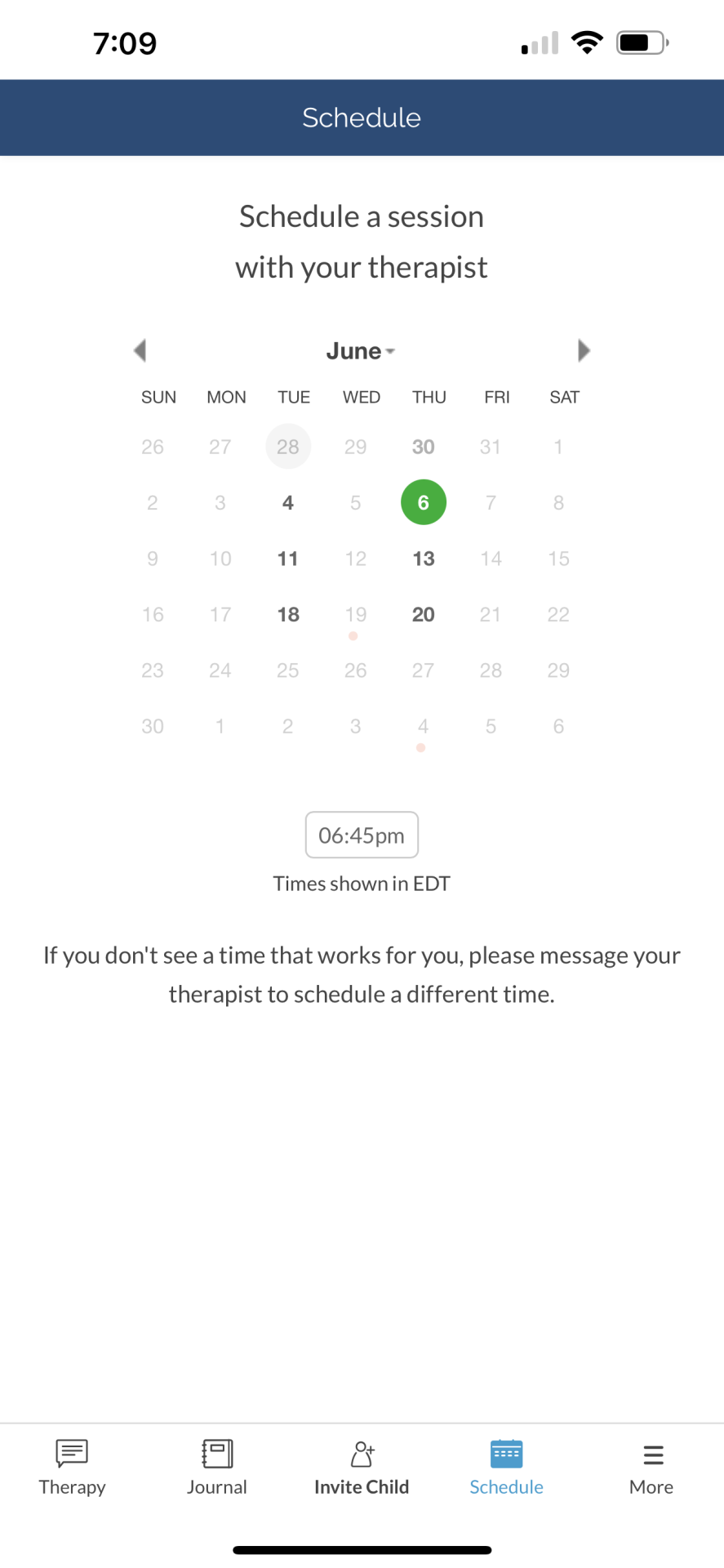
Who may like Teen Counseling: Families looking for accessible online mental health care for their teens can get their teen matched with a therapist in a matter of days. The platform allows you to select your therapist according to the issues your teen is facing, such as symptoms of anxiety, depression, or ADHD.
Who may want to avoid Teen Counseling: People who need to pay with insurance should seek another platform for teen counseling, like Talkspace or Brightside. Also, online counseling may not be appropriate for teens with complex symptoms.
How we score Teen Counseling
| Criteria | Score | How Teen Counseling measures up |
| Availability | 9.3/10 | Teen Counseling’s customer service is available 7 days a week through email and chat during normal working hours. Users can connect with their provider through live videos, phone calls, and messaging. The platform does not offer any group or couples counseling, though it does have a mobile app and is available in all 50 states. |
| Data Privacy | 10/10 | Teen Counseling has no current lawsuits or class actions. We appreciated the platform’s transparent pricing and data privacy statement, which includes information on updates and opting out. While Teen Counseling has its HITRUST certification, it does not abide by PCI-DSS for credit card payments. |
| Inclusivity | 6.2/10 | The Teen Counseling website has no anti-discrimination statement, and users cannot browse the providers available through the platform before signing up. However, the website does show diversity in both genders and ethnicities. |
| Affordability | 8.5/10 | The average weekly cost of Teen Counseling ranges from $66 to $81, but there is no pay-per-session option. The platform does not accept insurance or FSA/HSA payments. However, eligible users may apply for financial assistance. |
Teen Counseling tester insights
Our testers report it’s easy to get matched with a therapist on Teen Counseling. For one tester who had trouble finding a provider in their area through other platforms, Teen Counseling offered support at a crucial time of transition in their teen’s life. They like the option to message the therapist independently of their teen to check in and share information.
During sessions, our testers encountered some technical difficulties that required them to switch from a live video to an audio session. Though the therapist handled the situation appropriately, they mentioned to our tester that these technical difficulties aren’t uncommon on the platform.
From one of our Teen Counseling testers
“The first time we used the platform, the video wouldn’t work. The therapist really quickly switched the session to an audio call, and our teen didn’t seem to mind. I would have preferred my teen to have a face-to-face session, but I was impressed with the therapist’s professionalism.”
Though the therapist they found through Teen Counseling was well-matched to their teen’s needs, one of our testers decided their teen would do better with in-person therapy. After contacting the therapist to cancel their plan, our tester was still charged the monthly fee just days later. The tester emailed Teen Counseling’s customer support team to explain the situation and request a refund. Customer support promptly responded and issued a refund within days. They even applauded the family’s decision to do what was best for their teen.
What other Teen Counseling users say
In our February 2024 survey of 100 Teen Counseling users, 42 percent of respondents shared that their teen who uses the platform identifies as neuro-divergent. Additionally, 82 percent of respondents somewhat or completely agree that the therapist created a safe space for their teen.
In our March 2024 survey of teens who have used online therapy, one teen said the most challenging part of online therapy was “opening up to my therapist” because “it takes a couple of sessions to really trust them.” It may be helpful for parents to remember that it can take a few sessions for teens to feel comfortable enough with a therapist to share personal information.
Learn more in our Teen Counseling review.
Little Otter: Best platform for families
Pros and cons of Little Otter
Why Little Otter is our pick for the best for families
When a child is struggling with mental health issues, it often affects the whole family. The reverse can also be true—parental stress can affect the behavior and feelings of children. We chose Little Otter as our top pick for online family therapy because it addresses the family members individually and as a unit. Children, teens, and parents can see a therapist on their own, or the entire family or just the parents can work together on issues. A comprehensive care plan is established at the start of therapy.
Who may like Little Otter: Families looking for online therapy options to address issues that affect the whole family should consider Little Otter’s “whole family” approach.
Who may want to avoid Little Otter: Because Little Otter has limited insurance options and can be expensive, it may not be ideal for families who need to pay with in-network insurance.
How we score Little Otter
| Criteria | Score | How Little Otter measures up |
| Availability | 8/10 | Little Otter’s website has limited customer service hours, and users can reach out via phone or email. Little Otter users can connect with their provider via live videos, but phone and messaging sessions are not available. The platform offers group and couples counseling and its own mobile app, but it is only available in 13 states and the District of Columbia. |
| Data Privacy | 9.5/10 | Little Otter has no current lawsuits or class actions. It offers transparent pricing and a clear data privacy policy. However, Little Otter does not have its HITRUST certification, and it does not abide by PCI-DSS for credit card payments. |
| Inclusivity | 7.2/10 | There is not an anti-discrimination statement on Little Otter’s website, and users cannot browse provider profiles before signing up. The website images are widely diverse. |
| Affordability | 8.9/10 | Little Otter’s average weekly cost is under $113, and there is no option to pay-per-session option. The platform accepts insurance and FSA/HSA payments, but there is no financial assistance available. |
Little Otter tester insights
Though Little Otter is one of the more expensive out-of-pocket platforms we’ve tested, it offers a truly comprehensive approach to family mental health care. You’ll start by creating an account and filling out a questionnaire about your family’s overall well-being. The report offers potential areas of concern for you and your family—such as family stress, anxiety, or depression. The next step is to schedule a kick-off session. This 30-minute session costs $20 with in-network insurance and, for our tester, could be scheduled as early as the next day.
We like that Little Otter has therapy options for everyone in the family, and we like that they assess and treat the family as a whole. For example, couples can attend sessions to address specific parenting challenges—like sibling rivalry, for example—and children can also have one-to-one sessions with their therapist. All Little Otter therapy notes are saved in the “Care Den” in your account, so you can view session notes at any time. You can also go to the Care Den to schedule appointments and find additional resources that have been specifically curated for your children’s ages and your family’s needs.
From one of our Little Otter testers
“The initial family assessment offered a helpful snapshot of our family’s well-being and motivated us to make some changes.”
What other Little Otter users say
In our October 2023 survey of 600 online therapy users, 42 percent of those who used online platforms for family therapy continued therapy for one to six months, and 32 percent worked with a family therapist for seven months or longer.
On the Apple App Store, the Little Otter Health app gets 4.3 out of 5 stars. Users cite quality therapy experiences and helpful parenting tools, while negative reviews cite high costs.
Other online therapy platforms to consider
We tested many other online therapy platforms in order to find the best. Though they didn’t make it into our top recommendations, these platforms might be right for your specific situation.
Talkiatry is an online psychiatry provider available in 43 states. It’s a large network of virtual psychiatry providers treating patients as young as five who have an in-network insurance plan. Any patients under 18 will require treatment consent from a parent or guardian. Users can switch providers anytime, and Talkiatry’s providers offer psychiatry services and medication management. They can also refer you to a therapist to provide supportive care. Unlike Brightside, Talkiatry doesn’t have an app or extra resources that can integrate your mental health care with its providers. Instead, the platform uses the HIPPA-compliant Healow app to connect patients directly with their provider for messaging and video sessions.
In between sessions with your psychiatry provider, you can message them through Talkiatry’s platform. Our tester reviewed her message history and reported, “My current psychiatrist responds back within three hours each time.”
Talkiatry billing is pay-per-session, so you won’t have to worry about a membership fee or monthly subscription, and you can switch providers at any time. Although the cost of a session with Talkiatry varies by your provider and insurance plan, copays may range from $20-$50 per session.
Unfortunately, this platform isn’t yet widely available for everyone. Its providers are in-network with a few insurance plans, and the platform doesn’t accept out-of-network patients or those who want to pay out of pocket. As of this writing, it’s currently unavailable in North Dakota, South Dakota, Idaho, Wyoming, New Mexico, Alaska, Hawaii, and Delaware.
Talkiatry’s website clarifies that not all conditions and patients are a good fit for virtual treatment. The platform does not provide treatment for certain complex conditions, such as schizophrenia and eating disorders, which require in-person care. Talkiatry specializes in treating the following conditions:
- Anxiety
- ADHD
- Bipolar disorder
- Depression
- Insomnia
- OCD
- PTSD
- Substance use disorder
We recommend Talkiatry if you’re in-network with its providers, live in one of the 43 eligible states, and are looking for pay-per-session online psychiatry providers.
“I was going through intense anxiety, and finding a psychiatrist in person was impossible. The closest ones to me were an hour away as I live in a relatively small town. Additionally, seeing a psychiatrist seems more difficult than finding a therapist. I wanted to find something quick and online, and Talkiatry was the first platform to pop up. I was specifically looking for someone who could prescribe me medications, and that was the biggest draw for me with Talkiatry.” -Online Talkiatry user
Calmerry is a subscription-based online therapy platform with three plans:
- Messaging: $228 per month.
- Messaging + Two Live Video: $310 per month.
- Messaging + Four Live Videos: $360 per month.
- Four Live Videos: $250 per month.
The platform has a reflection chatbot with daily prompts, and unlimited messaging is included with every plan.
We didn’t like that provider choice may be limited depending on location. Our tester had a difficult time finding providers that fit their needs and were only offered three possible providers by customer service.
Additionally, with brief 30-minute live sessions, sometimes our tester didn’t get the full session time with their provider if the provider entered late and had more appointments to attend right after. We recommend Calmerry if you prefer connecting with your provider regularly through messaging.
Learn more in our Calmerry review.
We don’t recommend Grouport as a primary option for online therapy because, while it offers a unique approach through group therapy sessions, this model isn’t ideal for everyone. Some individuals may thrive in a group setting, where they can connect with others facing similar challenges and share experiences. However, for those seeking personalized, one-on-one attention from a therapist, this platform will not meet their needs.
For more information, read our complete Grouport review.
Mental health resources for underserved populations
The Handbook Team knows that not all people in the United States have equal access to health care. People from racial and ethnic minority groups are less likely than white people to receive mental health care, and LGBTQ+ individuals are more likely to report a range of negative provider experiences compared to non-LGBTQ+ people. These populations often face barriers to getting the mental health care they need, including discrimination and a lack of providers who share their identity or speak their language.
From one of our testers
“I was only given three [therapist] options and still couldn’t get the type of therapist I was looking for. When I didn’t find the therapist I was looking for, I felt unseen and underrepresented. Often, I’m reminded that I am a minority due to the lack of representation of someone who looks like me. This was just another example of that.”
Finding inclusive care
It’s important to find care that affirms and honors your identity. All of the platforms we recommend use inclusive language in their onboarding process, but it could still be challenging for some people to find a therapist they feel comfortable with. The following platforms may help you find the kind of care you’re looking for:
- Inclusive Therapists makes therapy more accessible for intersectional identities. Its mission celebrates and prioritizes the needs of people with marginalized bodies and identities.
- Therapy for Black Girls is a mental health resource (including a blog and podcast by a licensed therapist) for Black women and girls. It has a provider directory to find providers who can provide supportive care.
- Therapy for Black Men is a directory creating greater access to mental health care for Black men. It also has a financial assistance program to provide free therapy sessions for Black men.
- National Queer & Trans Therapists of Color Network connects queer and trans Black, Indigenous, and People of Color with therapists who match and affirm their identities. Learn more in our NQTTCN review.
What to consider when choosing a therapist
An important part of having a successful therapy experience is finding the right therapist. Go into your first session with an open mind and the knowledge that it may be necessary to switch therapists if you don’t feel a connection.
Here are some questions to ask your therapist to ensure a good fit:
- What are your qualifications? (This may include the number of years practicing, licensing, and certifications.)
- Do you have experience treating people with my particular concerns?
- What is your approach to therapy? (This could also be described as a therapist’s philosophy.)
- Can you describe a typical therapy session with you?
- Do you fit my budget? (Ask about price per session, sliding scale fees, and insurance plans accepted.)
For more information on how to select a therapist, read our article on Finding a Therapist Who Can Help You Heal.
Handbook’s research into online therapy platforms
The Handbook Team researched more than 70 online therapy and psychiatry platforms, directories, and networks. Based on our research, we signed up for the top 20 platforms to test out for ourselves.






First-hand testing experience
Testers explore the platforms and attend online therapy sessions for at least four weeks. Our testers are instructed to test the platforms through the lens of a real user, paying attention to how easy or difficult it is to find a therapist they can talk to. Additionally, testers are located throughout the United States, allowing us to gauge the availability of providers in different locations. Testers log their experience in a diary and come together to share their findings when testing concludes.
Each Handbook Team tester signs up for the platform and attends four weeks of therapy sessions. They also test additional features of each program, including messaging with providers and bonus resources like digital journals and self-guided lessons. Each tester pays close attention to the platform’s ease of use, taking notes on how easy or difficult it is to schedule appointments, switch providers if needed, and cancel or change a subscription.
Online therapy surveys
We received survey responses from over 2,000 online therapy and psychiatry users in varying age groups, and we continue to run surveys to keep up to date on how people use the platforms we recommend. Our surveys ask current users of dozens of the most popular online therapy and online psychiatry platforms to evaluate each service. We ask about the therapist matching process, therapist quality, and switching therapists. We also ask users to rate each platform for inclusivity, ease of use, and data privacy.
Survey feedback teaches us firsthand how users leverage each platform’s unique features. We use information from our surveys to rate the online therapy platforms we recommend and to get a better understanding of which features are most useful to users.
Focus groups
We host focus groups with practicing online therapists and current online therapy and psychiatry users to understand what each group values on their side of the screen. We ask the therapists about the pros and cons of teletherapy and learn what factors influence online therapy and psychiatry users to choose one platform over another.
Focus groups offer us the opportunity to hear directly from users about the impact of online therapy on their lives and to understand their reasons for choosing online therapy over in-person therapy. Focus group participants also discuss the benefits and drawbacks of virtual mental health care.
On-going online therapy testing
We are constantly testing new online therapy platforms to ensure we provide the most up-to-date information. Our reviews cover platforms with different specialties, including ADHD, anxiety, depression, and medication management, to ensure they meet the diverse needs of our readers.
Our online therapy and psychiatry rating indexes
We created a unique rating index to see how varying platforms measure up to four key factors:
- Affordability: We look for platforms with affordable out-of-pocket prices. We also include counseling services that accept insurance or offer financial aid.
- Data privacy: We examine how each platform collects and handles user data. If a brand doesn’t have this info available on their website, we reach out to learn from them directly.
- Therapist availability: We collect data on a brand’s total number of in-network therapists and their appointment availability in different states.
- Inclusivity: We evaluate platforms on their inclusivity and diversity of practitioners. We also note if a platform allows you to filter therapists by ethnicity or gender identity.
Mental health experts
A group of seasoned mental health professionals offered insight on online therapy platforms for this article, helping us ensure that it contains up-to-date information and expert knowledge.
Learn more about our online therapy testing and review methodology.
Our online therapy testing process
Virtual therapy platforms we don’t recommend
In our research, we encountered some online therapy platforms we don’t think are safe for our readers.
Cerebral
We advise our readers to avoid Cerebral, an online platform offering therapy and psychiatry. Cerebral has a history of overprescribing controlled medications, making it difficult for its users to cancel their subscriptions, and sharing patient data with advertisers. As of May 2022, Cerebral providers can no longer prescribe controlled substances.
7 Cups
We also can’t recommend the online therapy platform 7 Cups, a chat-based platform that advertises “free online therapy and counseling.” Messaging with a therapist is actually $150 per month, and the “free” messaging is either with an AI chatbot or a volunteer “listener.” Listeners on 7 Cups have no credentials and aren’t verified to be safe. We do not recommend 7 Cups because of its misleading “free therapy” claim and its listener chat, which can be unsafe for vulnerable users looking for mental health support.
In a mental health emergency
Online therapists may not be the most appropriate resource to help in a mental health crisis. If you or someone you know is a danger to themselves or others around them, it’s an emergency that can’t wait for an online therapist’s response.
Don’t wait. You can find help immediately by:
- Calling 911
- Visiting an emergency room
- Visiting urgent care
- Calling or texting 988 for the Suicide & Crisis Lifeline
- Chatting online at 988lifeline.org
- Calling the Substance Abuse and Mental Health Services Administration (SAMHSA) Helpline at 1-800-662-4357 or texting your zip code to 435748
- Calling the National Sexual Assault Hotline at 1-800-656-4673 or chatting online
All the above options will connect you with trained professionals who can provide crisis support. You can find even more resources, including international options, on our helpline directory page.
What is online therapy?
Online therapy, also known as virtual therapy or online counseling, is a way to receive therapy virtually on your mobile device, laptop, or personal computer. Unlike traditional in-person therapy, which takes place at a therapist’s office, online therapy enables a patient to connect with a qualified therapist from the comfort and privacy of their home. To attend an online therapy session, all you need is an internet connection, a device with a microphone and camera, and a safe and quiet space.
What is the difference between online therapy and online counseling?
Online therapy is provided by licensed therapists or psychologists, while online counseling can be provided by a wide range of individuals, including therapists, social workers, and counselors. Online therapy is often more structured with specific goals, while online counseling is often more flexible and less formal.
Online therapy vs. in-person therapy
While both online and in-person therapy can be an effective treatment for mental and emotional health problems, the biggest difference is how treatment is delivered. Online therapy platforms may offer text messaging, live chat, weekly phone calls, or live video chats. But it’s the latter that gives people the closest experience possible to traditional, in-person therapy, which means it’s most likely to offer the same rewards.
Since people are frequently online and comfortable using digital devices, online therapy has become convenient and accessible option for many. It allows users to connect with licensed therapists from the comfort of their own homes, making it easier to fit mental health care into their busy schedules.
From a focus group participant
“I went to one of the therapists in my town, which is kind of a smaller town, but I wasn’t really happy with the therapy I received there. And to be honest, there just isn’t a very good selection where I’m located. So that was one reason why I decided to go ahead and look into the online options.”
The ability to communicate between sessions with a therapist can be valuable, but most experts agree that online therapy is most effective when it includes regular face-to-face sessions. That’s because body language and other nonverbal cues play an important role in how we communicate as human beings. Facial expressions, mannerisms, posture, and tone of voice are all forms of communication, and subtleties here can be critical in helping your therapist pick up on inconsistencies between your verbal and nonverbal responses.
Face-to-face interactions with a therapist, whether online or in person, can also help create a connection by building trust. It’s much easier to do that when you’re face to face rather than exchanging written messages or speaking over the phone.
From a focus group participant
“When I started online therapy for the very first time, I was unable to connect with my therapist…The digital space was a barrier, but I adapted to it later on.”
Benefits of online therapy
- Convenience: Online therapy allows you to access help from anywhere as long as you have a fast, reliable internet connection. It eliminates the time and money spent traveling to and from appointments, arranging childcare, or taking time off work. It also eliminates the long travel times for those who live in rural areas and may open up users to specialists outside of their immediate location.
- Comfort and safety: Seeing an online therapist from the comfort and security of your own home may make it easier to open up about your feelings. For those with mobility issues, chronic illness, or a condition that makes it challenging to leave home, online therapy can be ideal.
- Selection: With online therapy, you aren’t limited to local therapists. Regardless of where you live, you’ll likely have access to a greater selection of qualified therapists. That means a greater likelihood of finding someone you trust who specializes in the treatment you need. Plus, online therapy platforms often make it easy to switch therapists until you find the right match.
- Ease of communication: The messaging feature of many online therapy platforms enables you to easily communicate with your therapist between live sessions to share your emotions and problems in real-time. It can also serve as a valuable way to track your progress and monitor any setbacks.
- Privacy: For some people, there is still a stigma associated with seeking treatment for mental health problems. It may feel easier to receive treatment online than to visit a therapist in person and risk being seen in the waiting room or parking lot.
Drawbacks of online therapy
- Technical issues: One challenge of online therapy is the potential for technological issues. Without a fast, reliable internet connection and device, you won’t be able to complete a video chat session with your therapist. What’s more, even with reliable connections and equipment, internet outages can still occur. It’s important to consider personal limitations with technology as well. Some people may struggle to navigate online platforms.
- Loss of emotional connection: With online therapy, patients don’t share the same physical space as their therapist. Even with video sessions, that loss of in-person intimacy can make it harder to connect emotionally.
- Unqualified providers: Online mental health services may come with a higher risk of falling prey to an unqualified or disreputable provider. Make sure to check a therapist’s credentials carefully. Licensed therapists are required to hold specific credentials that vary from state to state. Check for proper licensing to ensure the therapist is legitimate and equipped to provide care within your state’s guidelines.
- Platform security: A major concern with online therapy is the security of personal information and data privacy. While many platforms claim to protect your sensitive information, it’s important to ensure they’re HIPAA-compliant, which means they follow strict regulations to safeguard your health data.
How to choose the best online therapy platform for you
Through our focus groups and surveys, we’ve learned that the following factors are important to people when they’re choosing an online therapy platform:
- Cost: You need an online therapy platform that fits your budget. Before choosing a platform, find out how much they charge per month and how that matches up with what you can afford to pay.
- Insurance: Finding an in-network provider can greatly lower the cost of online therapy. Check with online platforms that take insurance, like Talkspace and Brightside, to see if your plan is accepted.
- Digital privacy: We know that digital privacy is important to our readers. Read each platform’s privacy policy to find out how they handle personal data. Some mental health care platforms and apps, like Cerebral, have been accused of prioritizing profits over privacy, so it’s important to ensure the platform you choose is responsible with your data.
- Ease of use: Test a platform’s functionality before you commit to it, especially if using a mobile app is important to you as a platform feature.
- Ability to choose or change therapists: Some online therapy platforms, like BetterHelp, match you with a therapist, while others, like Zocdoc, allow you to choose your provider from a list of filterable options. All of the platforms we recommend allow users the option of switching therapists.
- Psychiatry option: If you believe you could benefit from a combination of talk therapy and medication, consider using platforms like Brightside that offer both therapy and psychiatry with medication management.
You may find that you’re willing to be flexible on some aspects of a platform but not others. For example, one of our focus group participants shared that an online therapy platform “should just be easy for me to use. Navigation should be perfect. So, ease of use is really, really important to me. Pricing is something I consider a lot, but the truth is I’m willing to pay more if I find it easy to use—so it’s a stress-free experience.”
Not ready to make a decision about therapy just yet? Read our mental health articles to find some relief in the meantime.
How to get the most out of virtual therapy
The biggest benefit from any kind of therapy comes when you find the right therapist. Making that happen online can take time and effort, so be prepared to ask questions, read reviews, and take advantage of free introductory sessions. Do your research before you proceed with a particular platform and therapist, and be open to change if you decide it’s not working out.
It’s also helpful to be very clear about what you hope to achieve in therapy. Having specific goals makes measuring your progress much easier and ensures you’re getting the most out of the experience. Whatever your reasons for seeking therapy, make sure to communicate them with your therapist.
To get the best virtual therapy experience, remember to prepare for your sessions by limiting distractions at home, creating a quiet and private space, and ensuring your internet connection and device are in good working order.
How much does online therapy cost?
The cost of online therapy varies, depending on whether you’re using your insurance coverage or paying out of pocket, and prices can range from a $10 copay to a $300 per session out-of-pocket fee. Some of the companies we’ve reviewed offer a discount to new users or discount sessions if they are purchased in a bundle. For subscription-based online therapy platforms, we found that a weekly session costs about $81, and an average monthly subscription with four live sessions costs $325 per month. For more specifics on how much online therapy costs if you are insured, contact your insurance company.
Is online therapy covered by insurance?
Some online therapy platforms accept insurance, but many do not. With an in-network insurance plan, online therapy may cost as little as $10, or the amount of your copay. Talkspace is our pick for the best online therapy for using insurance, but Brightside, Zocdoc, and Little Otter also accept insurance.
While it is less common for online therapy platforms to accept Medicaid and Medicare, there are some options for patients with these forms of insurance, including Brightside and Zocdoc, with Talkspace also accepting Medicare in some states. Most of the best online therapy platforms also allow for HSA/FSA payment, which allows you to use pre-tax savings to cover the cost of mental healthcare.
How to save money on online therapy
Financial assistance is available through some online therapy services, which can be a great option for someone with a limited income. Many online therapy platforms offer discounts at sign-up, which is an opportunity to try services at a lower cost. Bundling multiple sessions is another way to save money on online therapy since many of these platforms offer monthly rates or discounts when you commit to a specific number of sessions upfront.
How to talk to therapists online for free
Finding free online therapy can be a bit challenging, but there are many ways to get started. Many platforms, like local church communities or university counseling services, offer mental health support at no cost. Some online platforms also provide free services, though the options are usually limited. For example, websites like 7 Cups offer free chats with trained volunteers, but we weren’t impressed with their vetting process.
While certain platforms advertise free therapy, we recommend exploring community-based resources for more reliable options. If you’re looking for free options, read our review of the best free online therapy.
Ask the mental health experts
For this article, and throughout our online therapy research process, we talk to mental health experts—including licensed clinical social workers (LCSWs), psychologists, and psychiatrists—to get their take on questions important to our readers.
What can I expect from any first therapy session, and how can I prepare for it?
From one of our mental health experts
“The initial session includes housekeeping issues such as length of session, cost, policy for no-shows, late cancellations, etc. Your therapist will also want to know what brought you to therapy at this moment in time, the ‘Why now?’ I think the best question to ask yourself prior to your first therapy session is, ‘How will I know therapy is working? What will be different in my life?’ Joining the initial session with this clarity provides an anchor for your work together.” —Andrea Parsons, LCSW
From one of our mental health experts
“The first therapy session is called an intake or assessment. Your therapist will use this session to learn more about you and gather pertinent information about your life, such as your family history, culture, history of your issues/concerns, your strengths, your support system, what you’ve tried before to alleviate your issues, and more. You can prepare for your first session by anticipating being asked many questions by your therapist, reviewing and completing all required paperwork, arriving a few minutes early, coming in with a list of questions you may have, being as open as possible, talking about your issues and what you’re experiencing, and reminding yourself you can decline to answer any questions if you don’t feel comfortable. If doing teletherapy, ensure you’re in a private enclosed space, your internet is stable, proper lighting in your room, logging on and checking your sound, camera, and internet service, and arriving a few minutes early.” —Canh Tran, LCSW
Our final verdict
Our overall pick for the best online therapy platform is BetterHelp because of its high user ratings, wide range of bonus features, and easy-to-use app. Monthly BetterHelp subscriptions are more affordable than many in-person options, but the platform doesn’t take insurance. To use insurance to pay for online therapy, we recommend Talkspace, Brightside, or Zocdoc. If you’re looking for online therapy for a specific issue, consider platforms that focus on a specific type of care. For instance, we recommend Brightside for those with anxiety and depression, Little Otter specializes in treating children and families, Regain therapists focus on relationship issues, and Online-Therapy.com uses a CBT approach.
Before you choose a platform, make sure online therapy is right for you. Weigh the benefits and drawbacks of online therapy compared to in-person therapy. For example, the comfort of speaking to a therapist from the privacy of your own home may outweigh your concerns about data privacy. Some people have no trouble connecting with a therapist virtually, but others may need in-person sessions in order to feel comfortable enough with their provider to share important issues.
Remember that a good therapist fit—finding someone who makes you feel safe and connected—is essential to a positive therapy experience. It’s always okay to switch therapists or platforms until you find a therapist who’s right for you.
Compare the best online therapy platforms of 2025
| Best For | People new to online therapy | People looking to treat anxiety and depression | People looking for online CBT treatment | People using insurance to pay | People seeking same-day appointments | People who want to choose their own provider | People seeking couples or relationship counseling | Families seeking therapy for their teens | Families seeking whole-family and/or child, teen, or couples therapy |
| Services | Individual therapy | Individual therapy; Psychiatry | Individual and couples therapy | Individual, couples, and teen therapy; Psychiatry | Individual and couples therapy; Psychiatry | Individual and couples therapy; Psychiatry | Individual and couples therapy | Individual therapy for teens | Individual, whole-family, teen, and couples therapy |
| Ways to Connect | Messaging; Text, audio, or video sessions | Messaging; Video sessions | Messaging; Text, audio, or video sessions | Messaging; Text, audio, or video sessions | Audio or video sessions | Audio or video sessions | Video sessions; Messaging | Video or audio sessions; Messaging | Video sessions; Messaging |
| Monthly Cost for Individual Therapy | $260–$400 | $299–$349 | $200–$440 | $276–$436 | Varies by provider | Varies by provider | $260–$360 | $260–$360 | $800* |
*Estimated monthly cost for kickoff session ($20) and four follow-up sessions ($195 each).
Frequently asked questions
Online therapy platforms that accept insurance include Talkspace and Brightside, which both accept Medicare and, in some states, Medicaid. On directory platforms like Zocdoc, some providers accept insurance, but not all do.
Many different platforms offer online psychiatry in addition to online therapy. While online therapists can’t prescribe medication, online psychiatrists can diagnose and prescribe certain medications if they’re deemed appropriate. Controlled medications, such as stimulants, often require an in-person visit with a health care provider, though restrictions vary by state.
Evidence suggests that online therapy can be just as effective as in-person therapy for many people. Not only does it improve accessibility and avoid the time, money, and inconvenience required to meet in person, but receiving therapy at home may make it easier for you to open up about your problems.
Mental health professionals use online therapy and online counseling as treatments for mental health concerns, and these terms are often used to refer to the same types of treatment. That being said, there is technically a difference between the two. Therapy is often concerned with long-term treatment of mental health conditions using psychotherapy in a variety of modalities. Counseling tends to focus on short-term mental health concerns, that may be connected to circumstances or a desire to make a specific change.
Yes, online therapists can be legitimate and effective, provided they are licensed professionals, and you use a credible platform. Reputable services work with therapists who meet the same educational and licensing standards as in-person therapists.
- (n.d.). The state of mental health in America. Mental Health America. Link
- Bhatia, R. (2023, April) What is psychotherapy? American Psychiatric Association. Link
- Office for Civil Rights. (2023, October 17). Telehealth privacy and security tips for patients. U.S. Department of Health and Human Services. Link
- October 2023. Pollfish. Online therapy survey. 600 respondents.
- February 2024. Pollfish. Online-Therapy.com survey. 100 respondents.
- (2017, July 31). What is cognitive behavioral therapy? American Psychiatric Association. Link
- Institute for Quality and Efficiency in Health Care. (2022, June 2). In brief: Cognitive behavioral therapy (CBT). InformedHealth.org. Link
- February 2024. Pollfish. Talkspace survey. 100 respondents.
- (2022, January 21). Certified community behavioral health clinics providing expanded access to mental health, substance use care during COVID-19 pandemic. National Council for Mental Wellbeing. Link
- Brooks, M. (2023, May 30). US psychiatrist shortage causing months-long wait times. Medscape. Link
- February 2024. Pollfish. Sesame Care survey. 100 respondents
- February 2024. Pollfish. Zocdoc survey. 100 respondents.
- February 2024. Pollfish. Brightside survey. 100 respondents.
- Kamenov, K., Twomey, C., Cabello, M., Prina, A. M., & Ayuso-Mateos, J. L. (2016). The efficacy of psychotherapy, pharmacotherapy and their combination on functioning and quality of life in depression: A meta-analysis. Psychological Medicine, 47(3), 414–425. Link
- Neece, C. L., Green, S. A., & Baker, B. L. (2012). Parenting stress and child behavior problems: A transactional relationship across time. American Journal on Intellectual and Developmental Disabilities, 117(1), 48–66. Link
- February 2024. Pollfish. ReGain survey. 100 respondents.
- February 2024. Pollfish. Teen Counseling survey. 100 respondents.
- Division of Diversity and Health Equity and Division of Communications. (2017). Mental health disparities: Diverse populations. American Psychiatric Association. Link
- Dawson, L., Long, M., & Frederiksen, B. (2023, June 30). LGBT+ people’s health status and access to care. KFF. Link
- Winkler, R., & Walker, J. (2022, March 26). Startups make it easier to get ADHD drugs. That made some workers anxious. The Wall Street Journal. Link
- Winkler, R. & Safdar, K. (2022, June 14). Mental-health startup Cerebral investigated by FTC. The Wall Street Journal. Link
- Whittaker, Z. (2023, March 10). Telehealth startup Cerebral shared millions of patients’ data with advertisers. TechCrunch. Link
- Wetsman, N. (2022, May 17). Telehealth startup Cerebral halts controlled substance prescriptions. The Verge. Link
- Park, E. & West, D.M. (2023, November 30) Why mental health apps need to take privacy more seriously. Brookings. Link
- (n.d.). Online prescribing. The Center for Connected Health Policy. Link
- Lammers, J., MD. (2022, March 14). Therapy vs. counseling: Is there a difference? Which is right for you? Ohio State Health & Discovery. Link






